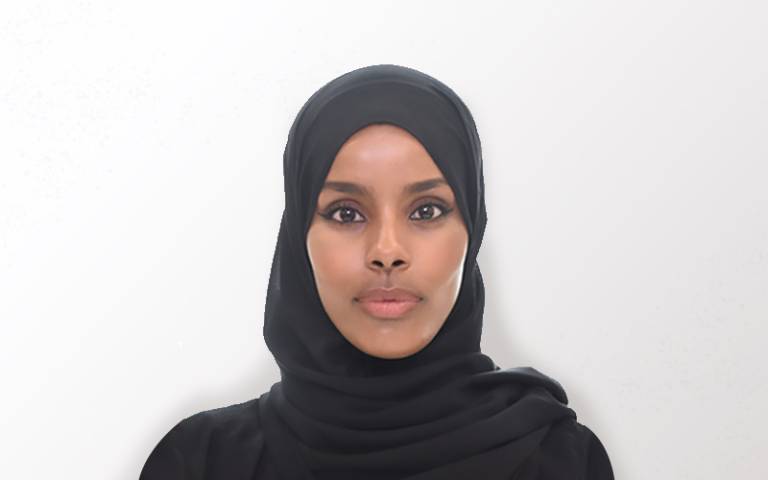Filsan Dudeye is a Special and Inclusive Education MA alumna, class of 2022. She talks to us about her experience studying at IOE.
 What attracted you to IOE and your course?
What attracted you to IOE and your course?

Soon after my undergraduate degree, I knew I wanted to pursue a career in teaching. My passion and drive to ensure every child in the classroom is provided with an equitable education finally felt like a reality for me.
However, during my NQT year, I faced the challenge of having 29 children with diverse needs and one particular child with severe special educational needs (SEN). With my limited knowledge and training on inclusive practices in the classroom, I felt compelled to further educate myself.
IOE’s reputation appealed to me, as it demonstrated a bespoke approach towards education and inclusion.
What were the most interesting things you did while at IOE?
While studying at IOE, I was exposed to a wealth of knowledge obtained by renowned professors and lecturers. They led inspirational and thought-provoking sessions that moved me to rethink my own perspectives and approaches to achieve inclusion.
Every module I took has shaped my practice today, the most influential to my practice being Psychology of SEN, particularly as I now work at the International British School in Qatar.
“Understanding the history, perspective and approach towards SEND here was very important, and the module allowed me to delve into the research and theory.
Moreover, my colleagues on that course were from 14 different countries, and we spent countless hours sharing best practices from around the world to reach every level of learner — from Early Childhood to Young Adults. It was an invaluable experiences provided by IOE.
Which organisation do you work for and what is your job title?
I currently work in an all-through International British School in Qatar. I work in the Inclusion department, leading and supporting inclusive practice thoughout the school.
Tell us about your current role.
In my role, I am responsible for ensuring teaching and learning is accessible for all children. This entails me planning meetings and holding one-to-one sessions, so that all a child's needs are considered on waves of the graduated approach.
“I also provide CPD training to both teaching and support staff to ensure pedagogy and teaching strategies are research-based and effective for their students.
How did your experience at UCL prepare you for your job?
I was fortunate enough to meet inspirational leaders who were able to share their invaluable knowledge, expertise and advice in their fields. This inspired me to apply theoretical, researched-based knowledge in my field to best serve children, families and colleagues.
What are your future ambitions?
I am greatly dedicated to utilising the knowledge gained from both the practical experience of my teaching career and a wider understanding from IOE's Special and Inclusive Education MA.
“I would like to continue working internationally and hope to one day work on government legislation and policy. I am also interested in pursuing a PhD, but that's a few years away.
What advice would you give to a student looking to get into a career in your sector?
I could share so many lessons I learnt along the way, but two that have been incredibly important to me are accountability and compassion.
“If you are in the position to serve others, hold yourself to account. By this, I mean be honest with yourself at the end of each day and consider what went well and what you could have done better.
During the process of developing in my field, I had to continuously reflect on my actions and find ways to provide more effective and impactful support. I do not mean this in strenuous ways; rather it is important to renew your intentions and reflect.
And compassion is of great importance – for those you serve and also yourself. I always consider the process families have to go through to accept and understand the diverse needs of their child. It isn’t easy. It takes time and it is my job to be as supportive and empathetic as I can be. It is also important that I provide myself with that same compassion and look after myself.
“The work of an advocator of inclusion can be tiresome and draining at times. But it is life-changing for those that need support, so remember that.
What have you done during your studies that has been most fulfilling to you?
During the final year of my MA, I decided to focus my dissertation on the intersecting identities of mothers and how this impacted their experience with the world around them and the school.
As I was in SENDCo at the time, I was fortunate enough to have built strong relationships with mothers at the school and got to ask whether they would like to participate in my qualitative study. These mothers shared stories that have greatly shaped my practice today.
Who or what has had the greatest influence on your career?
I felt my dissertation supervisor was an exemplary model for how an advocator for inclusion dedicates themselves to the role and supports others. Many of the strategies I put in place for myself have been from the discussions and advice I have received.
How do you approach professional development and networking?
I am very open and keen to meet new people.
“I treat every new encounter as an opportunity to learn something new, or sometimes to unlearn in order to learn again.
I’ve also found that the more you network, the more you discover new shortcuts to work smarter and more efficiently.
Last updated 27 March 2023.
 Close
Close


